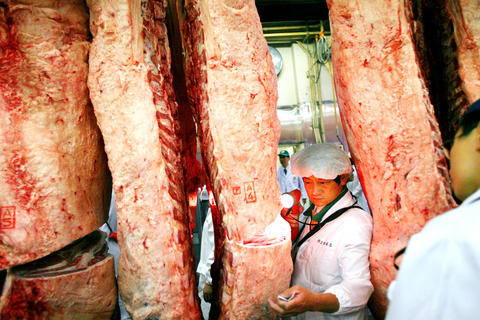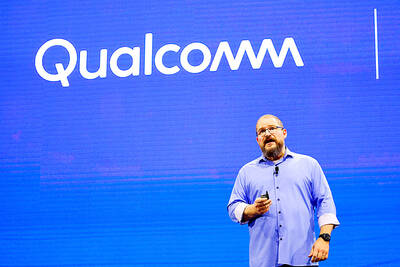Japanese beef prices -- already the world's highest -- are about to get even higher, the country's farmers said yesterday, warning that livestock feed prices have shot up from the global rush for ethanol.
But the farmers pleaded for public understanding from consumers, saying they face extremely difficult times.
"We are facing a crisis that is endangering our very survival," said Toshihiko Baba of JA Group, the nation's top agricultural organization. "This is unprecedented in being unlike any other feed price problems we have experienced."

PHOTO: AP
Baba and the other farmers said they will start a public campaign of their plight on Saturday, passing out 25,000 free packages of tissue paper on Tokyo streets with leaflets that explain why meat prices must go up.
The cost of feed in Japan has risen by about a third over the last year, mainly because of the rise in corn prices in the US, the world's leading producer of corn, a key ingredient in ethanol.
Demand is growing for ethanol, a kind of biofuel, because of soaring oil prices.
The farmers told reporters at JA's Tokyo office that the price-setting system here makes it difficult for prices to reflect feed costs.
Japan is notorious for high prices, Melons here sell for as high as 10,000 yen (US$90) each.
Although some prices, such as bread and instant noodles, have climbed from ethanol demand, Japanese meat prices, set in negotiations with chain stores, have stayed roughly the same in recent years -- 850 yen (US$8) for 100 grams.
That's about a tenth of the cost of US beef, which has been creeping lately on higher ethanol prices. Beef prices in the US last year rose about 4 percent from the previous year, and pork prices are up 2 percent. Retail beef prices vary, but beef costs about US$4 a pound (US$8.80 a kilo) in stores in the US.
To account for the rise in feed costs, the price of Japanese beef will need to go up by ¥15 (US$0.14) per 100g, the farmers said.
"We are going straight to the consumer to gain their understanding," said Shigeru Nishibaba, an organization official.
Japanese farmers have been dwindling amid international competition and the need to switch to large-scale ranches and farms to cut costs.
The number of beef cattle farms has nose-dived over the last four decades to 86,000 nationwide from 1.16 million, according to JA. Japan now has 7,800 pig farms, down from 714,000, and 26,000 dairy farms, down from 360,000 in 1966.
But the farmers stressed the need to keep food production alive in Japan to ensure food safety.
Concerns about imports from China have been growing after a recent large-scale food poisoning from dumplings that had been laced with massive dosages of pesticide. Police suspect foul play, but there have been no arrests.
The agricultural group said it was determined to drum up consumer support for their industry.
At Saturday's event, a former star sumo wrestler will demonstrate chanko, a dish of meat and vegetables cooked in soup that is famous in the traditional sport.
The farmers also demanded the government enact new measures to respond to the feed crunch. The funds for hedging against falling meat prices and fluctuating feed prices of the past are inadequate for the latest crisis, they said.
In 1960, Japan produced almost all the beef, pork and dairy products the nation consumed. In recent years, Japan imports about half of the beef and pork, as well as about a third of the dairy products.
"We want to continue to provide a stable food supply," Nishibaba said.

Intel Corp yesterday reinforced its determination to strengthen its partnerships with Taiwan’s ecosystem partners including original-electronic-manufacturing (OEM) companies such as Hon Hai Precision Industry Co (鴻海精密) and chipmaker United Microelectronics Corp (UMC, 聯電). “Tonight marks a new beginning. We renew our new partnership with Taiwan ecosystem,” Intel new chief executive officer Tan Lip-bu (陳立武) said at a dinner with representatives from the company’s local partners, celebrating the 40th anniversary of the US chip giant’s presence in Taiwan. Tan took the reins at Intel six weeks ago aiming to reform the chipmaker and revive its past glory. This is the first time Tan

Qualcomm Inc is strengthening its partnerships with Taiwan Semiconductor Manufacturing Co (TSMC, 台積電) and original design manufacturers (ODMs) in Taiwan as it expands its presence in the artificial intelligence (AI) computer market, CEO Cristiano Amon said in Taipei yesterday ahead of the annual Computex trade show. “Historically we’ve always been a very big customer of TSMC, and we continue to be,” Amon said during a media Q&A session. “For chip manufacturing, we’re among the largest fabless [semiconductor designers],” he said, noting that Qualcomm, a leading provider of mobile and AI-enabled chipsets, ships about 40 billion components every year, with TSMC being

‘FAILED EXPORT CONTROLS’: Jensen Huang said that Washington should maximize the speed of AI diffusion, because not doing so would give competitors an advantage Nvidia Corp cofounder and chief executive officer Jensen Huang (黃仁勳) yesterday criticized the US government’s restrictions on exports of artificial intelligence (AI) chips to China, saying that the policy was a failure and would only spur China to accelerate AI development. The export controls gave China the spirit, motivation and government support to accelerate AI development, Huang told reporters at the Computex trade show in Taipei. The competition in China is already intense, given its strong software capabilities, extensive technology ecosystems and work efficiency, he said. “All in all, the export controls were a failure. The facts would suggest it,” he said. “The US

NEW PRODUCTS: MediaTek has been diversifying its product lines to minimize operational risks as mobile chips remain the company’s biggest revenue source MediaTek Inc (聯發科), the world’s biggest supplier of smartphone chips, yesterday said the tape-out process for its first 2-nanometer chip would take place in September, paving the way for volume production of its most advanced chip, likely to be its next-generation flagship smartphone chip, around the year-end at the earliest. MediaTek has been leveraging advanced process technologies from its foundry partner, Taiwan Semiconductor Manufacturing Co (TSMC, 台積電), to build its flagship mobile phone chips, a segment it once relinquished and then recovered four years ago as it released its Dimensity series. In the semiconductor industry, a tape-out refers to the